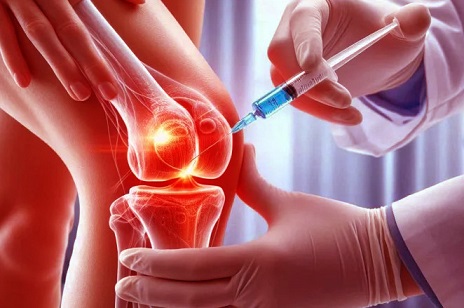Potential of Mesenchymal Stromal Cell Therapy for Cartilage Regeneration in the Old or Aged
Nikhil Prasad Fact checked by:Thailand Medical News Team Dec 03, 2024 4 months, 1 week, 3 days, 5 hours, 27 minutes ago
Medical News: Cartilage damage, a common problem in aging and osteoarthritis (OA), often leads to joint pain, stiffness, and decreased mobility. Researchers have long sought ways to not only manage symptoms but also repair the underlying damage. A recent review conducted by experts from Hualien Tzu Chi Hospital and Tzu Chi University in Taiwan sheds light on a promising approach: mesenchymal stromal cells (MSCs).
 Potential of Mesenchymal Stromal Cell Therapy for Cartilage Regeneration in the Old or Aged
The MSC Revolution in Cartilage Repair
Potential of Mesenchymal Stromal Cell Therapy for Cartilage Regeneration in the Old or Aged
The MSC Revolution in Cartilage Repair
MSCs are special cells derived from bone marrow, adipose tissue, and umbilical cord, with the unique ability to transform into different cell types, including chondrocytes, which are vital for cartilage health. These cells also produce factors that reduce inflammation and aid in tissue repair. Unlike current treatments such as painkillers or joint replacement surgeries, MSCs address the root of cartilage damage, offering hope for regenerative therapies.
This
Medical News report explores how MSCs, when properly harnessed, can potentially reverse cartilage damage. MSCs have been shown to enhance cartilage repair in preclinical studies, restoring cartilage structure and reducing joint inflammation. However, challenges in translating these findings into effective clinical therapies remain.
Key Findings on MSC Therapy
MSCs work in two primary ways: through direct differentiation into cartilage cells and by releasing bioactive molecules that stimulate repair. Bone marrow-derived MSCs (BM-MSCs) are highly effective but challenging to harvest. Adipose tissue-derived MSCs (AT-MSCs) are easier to obtain and exhibit strong regenerative capabilities. Umbilical cord-derived MSCs (UC-MSCs) are increasingly popular due to their non-invasive collection methods and high proliferation rates.
Clinical trials have begun exploring the potential of MSCs. One study demonstrated significant pain reduction in OA patients after MSC treatment, while another showed improved cartilage quality. Although MSC therapies are generally safe, researchers are working on improving cell survival after transplantation and ensuring long-term effectiveness.
How MSCs Repair Cartilage
Cartilage repair through MSCs involves complex processes. When injected into damaged joints, MSCs differentiate into chondrocytes under the influence of growth factors like TGF-beta. These chondrocytes produce essential cartilage components such as collagen and proteoglycans. Additionally, MSCs release anti-inflammatory cytokines and growth factors that promote tissue repair.
However, the success of MSC therapy depends on their delivery. Studies have shown that combining MSCs with scaffolds or hydrogels improves their retention and functionality. Scaffolds provide structural support for cells, while hydrogels protect them from degradation and ensure gradual release into the damaged tissue.
Advanced MSC Therapies: Exosomes and Gene
Editing
MSC-derived exosomes are emerging as a powerful alternative to whole-cell therapies. These tiny vesicles carry therapeutic molecules, including RNA and proteins, that promote cartilage regeneration without the risks associated with live cells. Exosome-based therapies are less likely to cause immune rejection and can be engineered for specific applications.
Gene editing is another frontier in MSC research. Techniques like CRISPR-Cas9 allow scientists to enhance the regenerative potential of MSCs by modifying genes that regulate their behavior. For example, tweaking certain pathways can improve MSC differentiation into chondrocytes or increase their resistance to inflammation.
Challenges in MSC-Based Cartilage Repair
Despite their promise, MSC therapies face hurdles. MSCs often lose their regenerative abilities during large-scale production. Variability in cell quality, patient-specific factors, and delivery methods also pose challenges. Moreover, the potential risks, such as immune rejection and unwanted side effects, require thorough investigation.
Conclusion
MSC therapies represent a promising solution for repairing damaged cartilage, particularly in OA. They offer the potential to not only alleviate symptoms but also restore joint function by regenerating cartilage tissue. Future research should focus on optimizing MSC sources, improving delivery methods, and conducting large-scale clinical trials to ensure safety and efficacy.
The findings of this review were published in the peer-reviewed International Journal of Molecular Sciences.
https://www.mdpi.com/1422-0067/25/23/12911
For the latest on Mesenchymal Stromal Cell Therapy, keep on logging to Thailand
Medical News.
Read Also:
https://www.thailandmedical.news/news/breaking-sars-cov-2-targets-endothelin-receptors,-causing-bone-and-cartilage-damage-and-joint-pains-endothelin-receptor-blocker-macitentan-helps
https://www.thailandmedical.news/news/proteins-called-galectins-identified-as-agents-responsible-for-cartilage-degeneration-in-osteoarthritis
